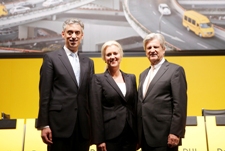Deutsche Post DHL will invest strongly in its mail, parcels and express networks this year togenerate further growth, CEO Frank Appel said at today’s AGM, while unions criticised the company’s
approach to staff in some overseas countries.Reviewing the 2011 and Q1, 2012 results, Appel told some 1,400 shareholders that DeutschePost DHL had performed “excellently” last year, had met all its targets and laid the foundation forfuture growth. “The group is positioned better than ever,” he commented. “We have a very strongpresence in exactly the places where growth is being generated: in the dynamic parcel business inGermany as well as in the emerging markets of the world that continue to grow rapidly.”
The CEO, who did not refer to the UPS takeover offer for TNT Express during his presentation,also said the company had no current plans for any major acquisitions.
In Germany, the company will invest around €420 million in new mail sorting equipment by theend of 2012. The largest investment in new letter technology since building the mail centres in the1990s will increase processing speed, improve delivery quality and ensure that mail sorting isperformed in a more environmentally conscious way. “This represents a clear commitment to thefuture of the letter,” Appel said.
The CEO said that Deutsche Post had made “a successful entry into digital communications”with its E-Postbrief product. “We are convinced that this product is in a very interesting market,”he commented. It was better positioned than competitors who had not yet entered the market fully,he added in a reference to the rival De-Mail service from Deutsche Telekom.
More than one million private customers, hundreds of large companies and government agenciesand some 4,000 SMEs had signed up to use the system. The digital service range would be extendedwith an identification function, available since April 17, and a payment function, due to beavailable in the second half of the year.
Appel also highlighted the ongoing €750 million investment in the modernisation of itsGermany-wide parcel network in order to increase capacity to cope with strong volume growth.
DHL’s strong position in Asia with overall revenues of €9.2 billion in the growth region wasstressed by Appel. DHL Express, for example, had increased TDI shipments from Asia by 10 per cent ayear between 2009 and 2011, with China ( 14 per cent), India ( 13 per cent) and Singapore ( 10 percent) all growing at double-digit rates. The regional network would be further strengthened withthe opening of the new $175 million, 55,000 sqm North Asia hub in Shanghai in July, while therewould be a $50 million expansion of the US hub at Cincinnati, he noted.
DHL Express had gained market share “in all regions” with higher TDI volume growth thancompetitors, the CEO told shareholders.
Parallel to the event, international unions released a report claiming that the company wasavoiding union representation outside Europe as well as over-using and underpaying temporary staffin contradiction to its corporate responsibility policies.
UNI Global general secretary Philip Jennings said: “DHL’s global practices are a definiterisk to the company’s ethics, reputation and image. This new report shows a shopping list of labourviolations. DHL clearly needs to address these concerns if it is to be seen as an ethical andresponsible global operator.” UNI and the ITF want the company to sign a global agreement torespect employee rights in all countries.
However, in his presentation, Appel stressed that employee satisfaction had risen to 71 percent last year from 67 per cent in 2010 and 61 per cent in 2009.
The AGM voted in favour of increasing the dividend for 2011 to €0.70 per share, five centsmore than for 2010, and authorised the board to list company shares outside Germany. However, thereare no immediate plans for any foreign share placement, CFO Larry Rosen already clarified yesterday(Tuesday).












